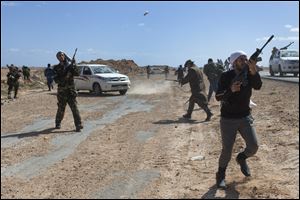
Greater U.S. role in Libya promoted
Senators push military action
3/7/2011
Opposition fighters fire at an approaching helicopter moments before it fired back, as they are pushed out of Bin Jawad and back towards Ras Lanuf, in eastern Libya, Sunday.
Sen. John Kerry (D., Mass.), chairman of the Foreign Relations Committee, for the first time raised the possibility of bombing military airfields in Libya to deny the use of runways to Libyan leader Muammar Kaddafi's air force.
Two of the Senate's top Republicans, Mitch McConnell of Kentucky and John McCain of Arizona, also argued forcefully for U.S. military involvement to keep Libyan warplanes grounded.
"We can't risk allowing Kaddafi to massacre people from the air," Mr. McCain, the ranking Republican on the Armed Services Committee, said on ABC's This Week with Christiane Amanpour.
But White House officials appeared to play down expectations for an expanded U.S. military role in the immediate future. While insisting that no options have been ruled out, White House Chief of Staff William Daley cited the difficulty of enforcing a no-fly zone over Libya, a vast country armed with modern, Russian-supplied antiaircraft defenses.
"Lots of people throw around phrases like no-fly zone," Mr. Daley said on NBC's Meet the Press. "They talk about it as though it's just a video game."
Mr. Daley's remarks echoed the caution voiced by Defense Secretary Robert Gates, who dismissed as "loose talk" the clamor for a U.S.-led air campaign. Any effort to secure the skies over Libya would have to begin with military strikes on Kaddafi's air-defense network and would inevitably lead to an expanded U.S. mission in a country roughly the size of Alaska, Mr. Gates said.
Mr. Kerry and other senators argued Sunday that Libya's air force could be disabled without the kind of expense and commitment required to maintain previous no-fly zones in Iraq and the Balkans. He also called for turning over to rebel groups some of Kaddafi's estimated $30 billion in frozen assets.
A no-fly zone is "not the only option for what one could do," Mr. Kerry said.
"One could crater the airports and the runways and leave them incapable of using them for a period of time," he said.
The debate over U.S. options highlights the dilemma facing the Obama Administration as Libya veers closer to all-out civil war.
The White House is confronting a range of options, including increased humanitarian aid and different gradations of military intervention, although none is likely to end the violence immediately, officials concede.
Nor is the United States likely to gather enough international support in the short term to quickly push Kaddafi from power, the sources said. U.N. Security Council members Russia and China have objected to any military action authorized by the United Nations, as has Brazil.
The Arab League also has spoken out against any Western-backed military intervention and raised the possibility of imposing a no-fly zone with the nations of the African Union.
Senior administration officials say days of fighting -- along the east-west coastal road to Tripoli and in and around the capital itself -- have resulted in a strategic deadlock on the ground. The Obama Administration is not ready yet, though, to call the situation a civil war.
Despite setbacks for the rebels in recent days, "parts of the country are firmly in opposition hands," while Kaddafi appears to firmly control other parts, said one senior administration official involved in designing Libya policy. The situation opens up possibilities for relief efforts but also places constraints on what the United States and its allies can do in places held by Kaddafi loyalists.
In Libya Sunday, forces loyal to Kaddafi, some in helicopter gunships, pounded opposition fighters with artillery, rockets, and gunfire, escalating their counteroffensive to halt the rebels' rapid advance toward the capital.
They also battled to loosen the grip of rebels on two cities close to Tripoli. But in at least one case, their tactics appeared to lead them into a trap.
Residents said pro-Kaddafi troops punched into the city of Misrata, 120 miles east of Tripoli, with mortars and tanks but were pushed out five hours later by rebel forces. The rebel commanders intentionally opened the way for government tanks to enter the city, then surrounded them and attacked with anti-aircraft guns and mortars, said Abdel Fatah al-Misrati, one of the rebels.
"Our spirits are high," Mr. al-Misrati said. "The regime is struggling and what is happening is a desperate attempt to survive and crush the opposition. But the rebels are in control of the city."
Sunday's fighting appeared to signal the start of a new phase in the conflict, with Kaddafi's regime unleashing its air power on the rebel force trying to oust the ruler of 41 years. Resorting to heavy use of air attacks signaled the regime's concern that it needed to check the advance of the rebel force toward the city of Sirte -- Kaddafi's hometown and stronghold. Anti-Kaddafi forces would get a massive morale boost if they captured Sirte, and it would clear a major obstacle on the march toward the gates of Tripoli.
The uprising against Kaddafi, which began Feb. 15, is already longer and much bloodier than the relatively quick revolts that overthrew the longtime authoritarian leaders of neighboring Egypt and Tunisia.
An opposition force estimated at 500 to 1,000 fighters pushed out of the rebel-held eastern half of Libya and has been cutting a path west toward Tripoli. On the way, they secured control of two important oil ports at Brega and Ras Lanouf.
Hundreds if not thousands of people have died since Libya's uprising began.
Tight restrictions on media make it near impossible to get an accurate tally. More than 200,000 people have fled the country, most of them foreign workers. The exodus is creating a humanitarian crisis across the border with Tunisia -- another North African country in turmoil after an uprising in January that ousted its longtime leader.
The Associated Press contributed to this report.